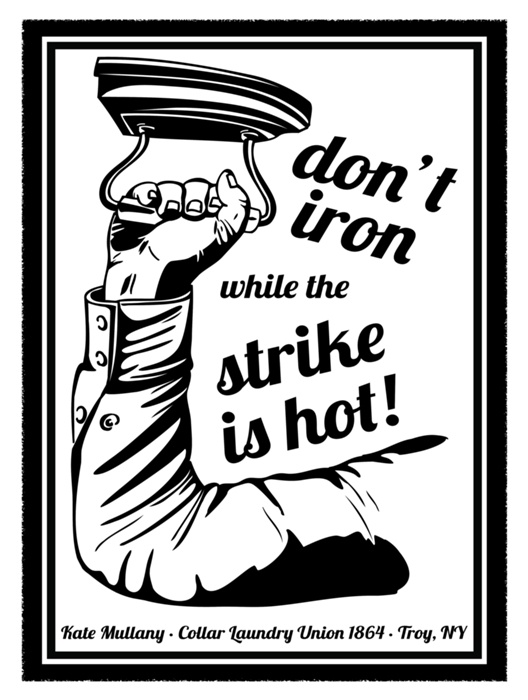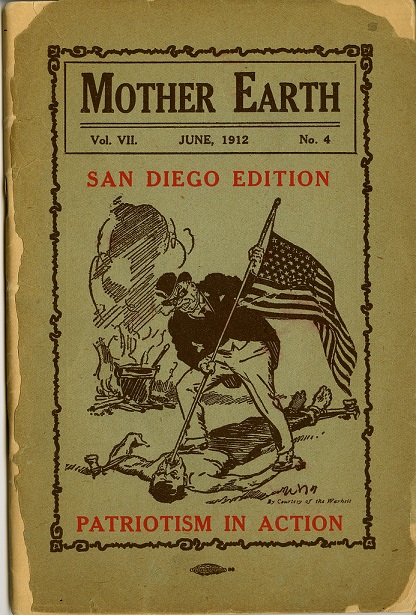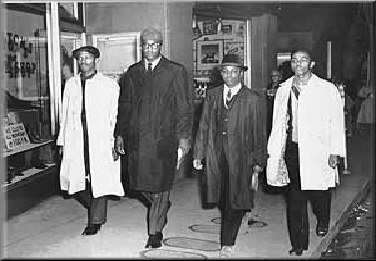Today in Labor History February 1, 1835: Mauritius abolished slavery.
1860s

Today in Labor History February 1, 1864: The Collar Laundry Union formed in Troy, New York. The Collar Union was the first all-female labor union in the U.S. Women typically worked 12-14 hours per day under dangerous conditions. Led by Kate Mullany, the union won a wage increase from $2 per week to $14 per week.
Today in Labor History February 1, 1865: President Lincoln signed the 13th Amendment to the Constitution, abolishing slavery. However, the 13th Amendment does not abolish all forms of slavery. The state is still permitted to force prisoners to work for free, or for wages far below the minimum wage. They are even allowed to do this and sell the products made by prisoners. And, so long as capitalism exists, wage slavery will still persist.
Today in Labor History February 1, 1867: Bricklayers started working 8-hour days.
1900s
Today in Labor History February 1, 1908: Republicans and members of the Carbonaria killed King Carlos I of Portugal and his heir apparent in the Lisbon Regicide. As a result of the assassinations and the anti-monarchy protests that followed, the constitutional monarchy ended several months later.
San Diego Free Speech Fight

Today in Labor History February 1, 1912: The Industrial Workers of the World (AKA the Wobblies or IWW) started the San Diego Free Speech Fight in response to a city ordinance preventing public speaking in and around the Stingaree neighborhood (now known as the Gaslamp Quarter). The authorities were trying to squelch labor and radical organizing in the multi-ethnic, working-class neighborhood, infamous for its houses of prostitution, gambling dens, opium dens and Chinese ghetto. Even as late as the 1980s, it still had a skid row feel, with its multitude of tattoo parlors, bars, sailors, junkies and fascination parlors. As a kid, I remember watching the con artists running games of 3-Card Monte on the sidewalks.
IWW Roots in San Diego
The IWW had been active in San Diego since 1906. They organized timber workers and cigar makers, as well as workers at San Diego Consolidated Gas and Electric Company. Their strike at the power company led to the formation of a public service union, which disbanded in 1911, when many Wobblies flocked to Tijuana to join the anarchist Magonista revolution there.
As the Free Speech fight progressed, anarchists, socialists and liberals joined the struggle, deliberately speaking in the restricted zone so that the jails would overflow. And they all demanded individual trials in order to clog up the legal system. Jail conditions were horrendous. Prisoners were crowded into the drunk tanks and forced to sleep on vermin-infested floors. Beatings were routine. 63-year-old Michael Hoy died from a police beating in jail. The IWW called on members from across the country to ride the rails to San Diego to join the fight. At least 5,000 heeded the call.
Vigilante Violence

The local papers, of course, ran countless editorials attacking the radicals and glorifying the police. This encouraged vigilantes, who’d patrol the rail yards looking for incoming Wobblies. They deported many across county lines where they forced them to kiss the flag and run through gauntlets of men who beat them with pick axe handles. On May 7, the cops killed another Wobbly, Joseph Mikolash. And on May 15, vigilantes kidnapped Emma Goldman and her companion Ben Reitman, who had come to show their support. However, before deporting them, the vigilantes tarred and feathered Reitman and raped him with a cane. Ben Reitman was a physician who focused his practice on providing treatment for tramps, hobos, prostitutes and the most marginalized members of society. The July 11, 1912 edition of the IWW’s “Little Red Songbook” included the song: “We’re Bound for San Diego:”
In that town called San Diego, when the workers try to talk, the cops will smash them with a sap and tell them “take a walk.” They throw them in a bull pen and they feed them rotten beans. And they call that “law and order” in the city, so it seems.
1920s
Today in Labor History February 1, 1929: Timber workers went on strike over an increased work week from 44 hours to 48.
1960s

Today in Labor History February 1, 1960: Activists began a series of sit-ins in Greensboro, North Carolina. Woolworth’s denied service to 4 black college students because of the color of their skin. In response, they refused to move from a lunch counter, setting off a series of similar protests. By September, 1961, over 70,000 students, white and black, had participated in the sit-ins.
1990s
Today in Labor History February 1, 1991: The Moroccan government sentenced 380 workers to 15 years in prison for participating in a General Strike.
Today in Labor History February 1, 1996: A million Russian and Ukrainian coalminers went on strike for back wages.